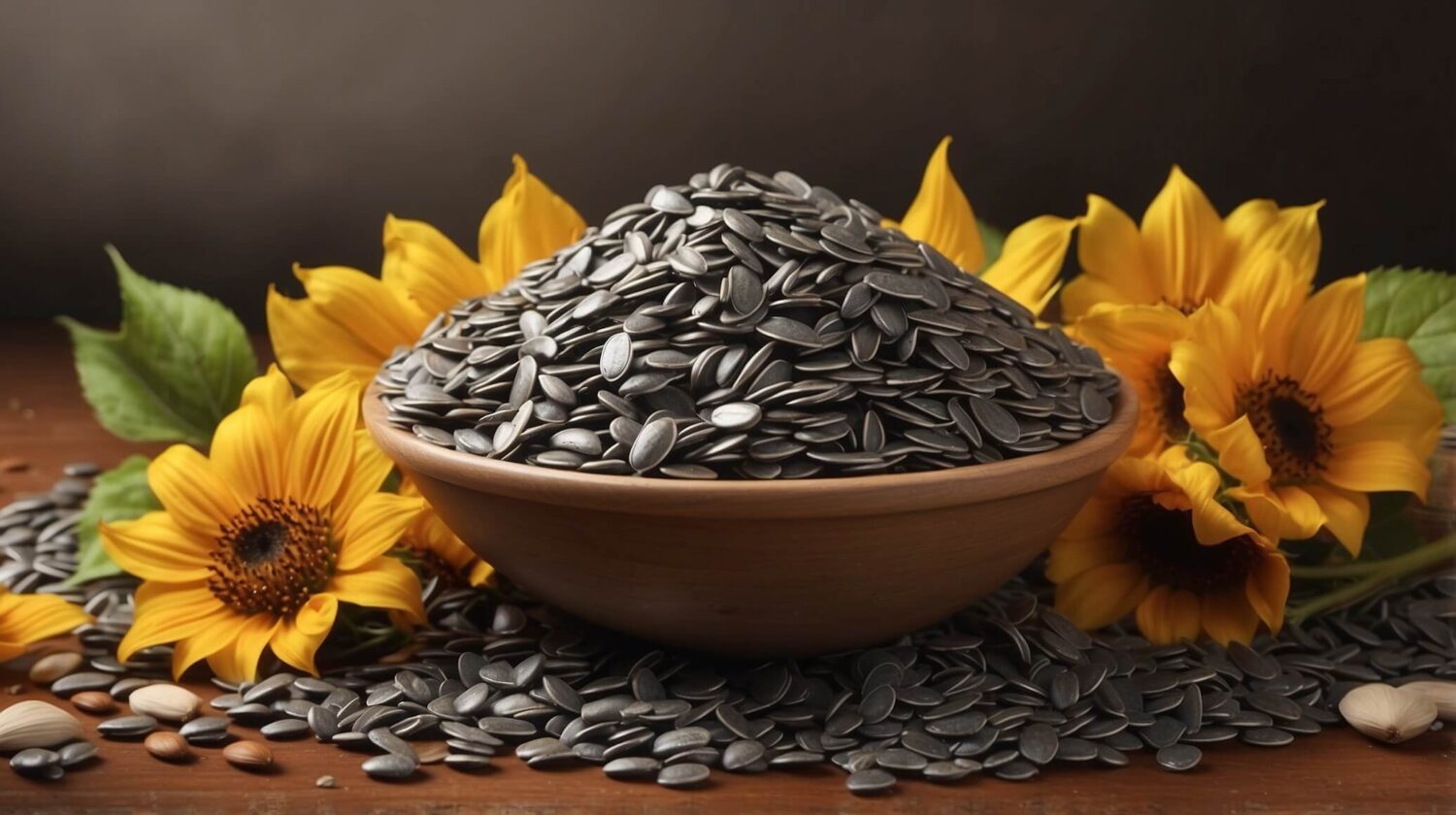When you munch on a handful of sunflower seeds, do you ever stop and think about the benefits they bring? Personally, I find it pretty amazing how something so tasty can pack such a nutritious punch. Let’s dive into why sunflower seeds are good for you and explore the myriad sunflower seeds benefits they offer.
Understanding Sunflower Seeds
Before we get too deep into the benefits, let’s have a quick chat about what sunflower seeds actually are. They’re tiny seeds harvested from the flower heads of sunflowers. While they’re often enjoyed as snacks, sunflower seeds also play a role in various dishes—from salads to granola bars.
What’s cool about sunflower seeds is their versatility. You can eat them raw, roasted, or even sprinkled on your favorite meals. So next time you see a dish topped with these little nuggets, consider that you’re not just elevating flavor—you’re also boosting nutritional content!
Nutritional Profile of Sunflower Seeds
One of the reasons why sunflower seeds are good for you comes down to their impressive nutritional profile. Just a quarter-cup serving contains numerous beneficial nutrients. To illustrate, this serving size includes:
– **Protein**: About 7 grams
– **Healthy Fats**: Approximately 14 grams, mainly polyunsaturated fats
– **Fiber**: Roughly 3 grams
– **Vitamins and Minerals**: Significant amounts of Vitamin E, magnesium, selenium, and copper (USDA)

These nutrients work together synergistically, making sunflower seeds a superfood that fuels your body in more ways than one.
Heart Health Booster
Research shows that sunflower seeds can contribute positively to heart health. Their high magnesium content helps regulate blood pressure—essential for maintaining a healthy heart. As someone who’s had family members struggle with heart issues, I think it’s crucial to consider ways to improve cardiovascular health.
Furthermore, sunflower seeds may also assist in managing cholesterol levels due to their healthy fats. Specifically, the polyunsaturated fats can help lower harmful LDL cholesterol while raising beneficial HDL cholesterol. This balanced lipid profile is a powerful ally against heart disease.
Antioxidants Galore
Another compelling reason why sunflower seeds are good for you lies in their antioxidant properties. Sunflower seeds are rich in Vitamin E, which is mostly known for its role in skin health. However, it’s also a powerful antioxidant that protects your cells from damage by free radicals.
So what does that really mean? Well, taking care of your cells can help reduce the risk of chronic diseases, like cancer. In fact, a study published in the *American Journal of Epidemiology* indicated that a diet high in Vitamin E may be linked to a lower risk of certain cancers (AJ Epidemiology).

May Aid in Weight Management
For anyone trying to maintain a healthy weight, sunflower seeds can be quite helpful. Oddly enough, despite being high in calories, these little seeds can help curb cravings. The combination of protein, healthy fats, and fiber may keep you full for longer periods.
I remember when I was on a diet a few years back. Instead of munching on chips, I switched to sunflower seeds. Not only did they satisfy my cravings, but they kept me on track without feeling deprived. Plus, when you’re conscious about what you eat, a small handful can really feel like a treat!
Nutrient Dense Snack Option
Let’s face it—snacking can be a minefield. With junk food practically everywhere, it can be tricky to make healthier choices. Enter sunflower seeds. These babies are nutrient-dense and can help nourish your body without empty calories.
Think about it this way: when you reach for chips or cookies, they may taste good, but they often lack the essential nutrients that our bodies crave. On the other hand, sunflower seeds not only provide energy but also fuel your body with nutrients.
Skin Health Benefits

Remember that Vitamin E I mentioned earlier? Well, sunflowers packs it like no other. The antioxidant properties of this powerhouse nutrient can support your skin’s health in various ways. It helps to protect against UV damage, promotes cell regeneration, and even supports healthy aging.
After using sunflower seed oil as a moisturizer for the skin, I can vouch for its effectiveness. Not only does it hydrate, but my skin feels more radiant as well. So, incorporating sunflower seeds or their oil into your diet can contribute to healthy skin, too—and who doesn’t want that?
Mood Enhancer
Are you familiar with the phrase “you are what you eat”? It’s true, especially when it comes to mental health. Certain nutrients found in sunflower seeds, primarily magnesium, play a vital role in managing your mood. Low levels of magnesium have been linked to increased anxiety and depressive states. Therefore, incorporating sunflower seeds into your diet can aid in boosting your mood.
In my own experience, when I’m feeling a bit down or anxious, I tend to gravitate toward healthy snacks. On days when I indulge in a handful of sunflower seeds, I genuinely feel lighter and more positive. It’s as if they not only nourish my body but also my mind!
Versatile and Easy to Incorporate
Consistency is key when it comes to reaping the health benefits of any food. Fortunately, sunflower seeds are incredibly versatile. You can munch on them as a snack, toss them in salads, blend them into smoothies, or even use them to enhance your breakfast cereals.
Recently, I discovered a new recipe that incorporates sunflower seeds into my morning oatmeal. They add a delightful crunch and take the flavor up a notch! Experimenting with sunflower seeds in different recipes has transformed my eating habits and made healthy eating much more enjoyable.
Sunflower Seeds and Athletes
Athletes can particularly benefit from the nutrients found in sunflower seeds. The protein content aids in muscle recovery, while the energy provided by healthy fats is perfect for fueling workouts. Additionally, the magnesium in sunflower seeds can help prevent cramps and muscle discomfort during strenuous activities.
I recall a friend who runs marathons. Just before races, he’d down a handful of sunflower seeds for that energy boost. Next time, I might just join him—after all, if these tiny powerhouses can fuel endurance, why not give them a shot?
Cooking with Sunflower Seeds
Wondering how to spice up your cooking game? Consider sunflower seeds as an ingredient. You can blend them into smoothies, use them in baking, or make sunflower seed butter.
And did you know you can roast sunflower seeds at home? Simply toss them in a pan with a pinch of salt for a delightful snack that you already know is full of goodness. Seriously, it’s an overlooked practice that’s easy and rewarding.
Potential Drawbacks to Consider
While sunflower seeds do have a wealth of benefits, there are a few points to keep in mind. For one, they’re calorie-dense. Moderation is key; otherwise, you might find those handfuls of goodness get a bit too heavy on the calorie count.
Additionally, some folks might be allergic to sunflower seeds. Always check with your physician if you have concerns about food sensitivities. And if you’re buying pre-packaged sunflower seeds, it’s smart to look for options without added salt or sugar to keep things healthy.
Wrap-Up on Why Sunflower Seeds Are Good for You
In conclusion, sunflower seeds offer a range of health benefits—from heart health to mood enhancement. Their versatility makes them an easy addition to your diet, and the nutritional payoff is genuinely impressive.
So the next time you hear someone talking about why sunflower seeds are good for you, just reference their amazing profile of nutrients and the myriad ways you can incorporate them into your meals. Trust me; your body will thank you for it!
Remember, small changes can lead to significant improvements. So why not grab that bag of sunflower seeds next time you’re at the store? Crunching on them could just change your life—for the better.
